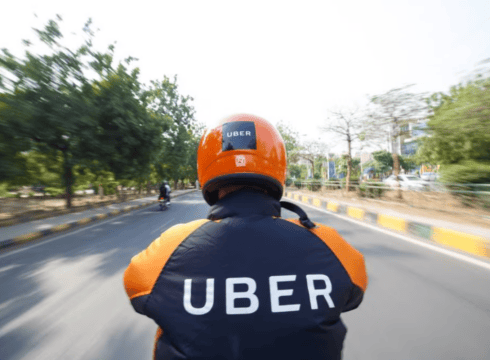Uber highlighted the last-mile delivery gaps bike taxis fill and called for a dialogue in response to the Delhi government’s decision to ban bike taxis
The ride-hailing major also highlighted the differences in electrification targets for bike taxis and other sectors like ecommerce in Delhi’s draft aggregator policy
Different electrification mandates not only lead to inequitable sharing of responsibility but seriously disadvantage the entire industry: Uber
Inc42 Daily Brief
Stay Ahead With Daily News & Analysis on India’s Tech & Startup Economy
Ride-hailing major Uber has urged the Delhi government to initiate an industry dialogue and arrive at a solution for the bike taxi ban and the electrification goals for two-wheeler ride-hailing aggregators.
The statement comes days after the Delhi government banned bike taxis, stating that operating private vehicles for commercial purposes violated the Motor Vehicle Act of 1988. The state government also warned of heavy fines if bike taxi aggregators were found to be operating despite the ban.
“Hundreds of thousands of people in Delhi use two-wheelers across ridesharing platforms, accounting for an estimated 20 Lakh trips every month,” said Shiva Shailendran, director of operations at Uber India & South Asia, in a blog post on Friday (February 24).
More than 19 Lakh trips in Delhi NCR were between metro stations, “underscoring the need-gap bike taxis fill in solving for the last mile commute”, he added.
Uber has become the first aggregator which has spoken on the Delhi government’s bike taxi ban.
On Monday (February 20), Delhi’s transport minister Kailash Gahlot said in a tweet that the government is working on a draft aggregator policy that includes two-wheelers, three-wheelers and four-wheelers.
However, speculation is rife that the government would only allow electric two-wheelers to operate as bike taxis in Delhi NCR. In the draft aggregator policy that the Delhi government released last year, it laid down specific mandates for the electrification of the bike taxi fleets.
Referring to the deadline for bike taxi companies to convert 100% of their fleet to electric vehicles (EVs) within two years from the notification of the aggregator policy, Uber said it is necessary to find all possible ways to help shared mobility drivers make the fair and equitable transition while looking for bold and ambitious ways to reach zero emissions target.
“Steep and infeasible EV mandates risk finishing off the sector as we know it. The impact of such a decision on the livelihoods and mobility needs of millions of Delhiites is clear. Transition, after all, is possible only if the businesses are still running,” Uber said.
Uber also highlighted the differences in electrification targets under the draft aggregator policy, which has set a deadline of April 1, 2030, for two-wheeler fleets operating in the ecommerce sector to completely move to EVs.
“Different electrification mandates for ridesharing and delivery sectors, not only lead to inequitable sharing of responsibility but seriously disadvantage the entire industry,” said Shailendran in the blog post.
Calling for the same treatment for two-wheeler ridesharing apps as for delivery and services, Uber said that the electrification timelines for conversion of the fleet should be the same across sectors.
“Uber is ready to commit to the same phased electrification mandates including full fleet electrification timelines as suggested for delivery companies,” it added.
{{#name}}{{name}}{{/name}}{{^name}}-{{/name}}
{{#description}}{{description}}...{{/description}}{{^description}}-{{/description}}
Note: We at Inc42 take our ethics very seriously. More information about it can be found here.


